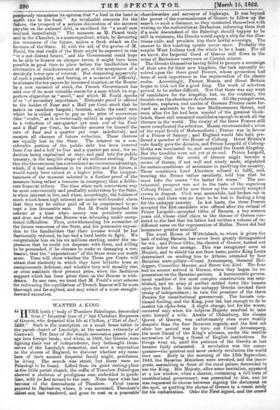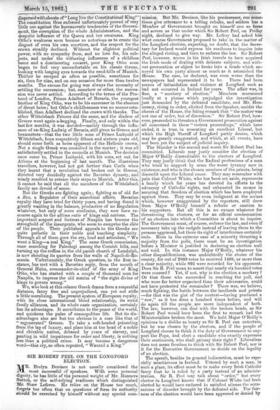WANTED A KING.
"JERE lyeth ye body of Theodore Paleologus, descended from ye Imperyal lyne of 34' last Christian Emperors of Greece, who departed this life at Clyfton, ye 21st of Jan, 106." Such is the inscription on a small brass tablet in the parish church of Landulph, at the eastern extremity of Cornwall. The fame of the simple greemeatun; passed years ago into foreign lands; and when, in 1828, the Greeks were fighting their war of independence, they bethought them- selves of the Landulph memorial, and sent s deputation to the shores of England, to discover whether any mem- bers of their ancient Imperial family might, perchance, be living. The search was strict, but there were no Peleologi to be found. Lifted from its quiet resting-place he little parish church, the coffin of Theodore Paleologus showed a skeleton of prodigious thee, embedded in quick- lime, with its feet turned to the east. None knew what had become of the descendants of Theodore. Faint traces pointed to Barbadoes, where, it was surmiaed, Theodore's adept aeon. had wandered, and gone to rest as a peaceable churchwarden and surveyor of highways. It was beyond the power of the commissioners of Greece to follow up the search to such a distance, so they contented themselves with writing to the authorities at Barbadoea, informing them that if a male descendant of the Peleolog,i should happen to be still in existence, the Greeks would equip a ship for the illus- trious exile, and proclaim him their lawful sovereign. The answer to this touching epistle never came. Probably the sceptic West Indians took the whole to be a hoax. For all we know, the Imperial blood of Greece still flows in the veins of Barbadoes vestrymen or Cornish miners. The Greeks themselves having failed to procure a sovereign of their own for their new kingdom, the task naturally de- volved upon the three great Powers, whose protection had been of such importance in the regeneration of the classic realm. Accordingly, France, Russia, and Great Britain began to look out for a good king. The work of selection proved to be rather difficult. Not that there was any want of candidates for the kingship, but, on the contrary, the trouble was the abondance de riehesses. All the younger sons, brothers, nephews, and uncles of German Princes came for- ward as aspirants to the new Mediterranean throne, and even after the list had been weeded of the greatest block- heads, there still remained candidates enough to stock all the thrones in the world. The rivalry of the three Powers still more complicated the selection. Russia recommended a scion of the royal family of Hohenzollern; France was in favour of a Prince of Saxony ; and England would fain haiTe pre- ferred a member of the House of Coburg. Great Britain's vote finally gave the decision, and Prince Leopold of Coburg- Gotha was nominated to, and accepted the Greek kingship. But the troubles were not, yet at an end. Prince Leopold, foreseeing that the crown of Greece might become a crown of thorns, if not well and wisely made, stipulated for certain conditions of assistance in pacifying the country. These conditions Lord Aberdeen refused to fulfil, and, treating the Prince rather cavalierly, told him that he must take the crown "for better for worse." The ma- trimonial prospect was not to the taste of the sagacious Coburg Prince, and he now threw up the scarcely accepted crown in disgust. Civil war, meanwhile, bad broken out in Greece, and there was no time to be lost in finding a king for the unhappy country. In hot haste, the three Powers accepted the first candidate who offered after the refusal of Prince Leopold—accepted Otho of Bavaria, a boy sixteen years old, whose chief claim to the throne of Greece con- sisted in the fact that his father had written a volume of in- different verse on the regeneration of Hetlas. Never did bad hexameter greater mischief. The royal House of Wittelsbach, to whom is given the task of ruling Bavaria, has never been greatly distinguished far wit ; and Prince Otho, the elected of Greece, turned out rather below the average. This was recognized even at Munich, and to shield his son from harm, poetic King Louis determined on sending him to Athens, attended by four Bavarian state-pillars—Count Armansperg, General Rei- degzer, Councillor Maurer, and Baron von Abel. The four had no sooner arrived in Greece, when they began its re- generation on the Bavarian pattern. A. bnreaucratic govern. went machine of the most complex construction was esta- blished, and an army of scribes settled down like locusts upon the land, In vain the unhappy Greeks invoked their treaty of independence ; in vain the promises of the three Powers for constitutional government. The locusts Con- tinued feeding, and the King, poor lad, had enough to do to master his alp ha-bets. A slight change, but for the worse, occurred only when his helpless Majesty resolved to take unto himself a wife. Amalie of Oldenburg, the chosen Queen of Greece, was unfortunately even more weakly despotic than the four Bavarian regents, and the first act after her arrival was to turn out Count Armansperg, the most liberal of the King's advisers, under the terrible accusation a being a friend of English institutions. So things went on, until the patience of the Greeks at last became fairly exhausted. A revolution was the conse- quence—the quietest and most orderly revolution the world ever saw. Early in the morning of the 15th September, 1843, the Bavarian Ministers were arrested, and the insur- gents, assembling in front of the royal palace, demanded to see the King. Adis Majesty, after some hesitation, appeared at a low window, when a charter, containing a full form of constitutional government, was presented to him, and he was requested to choose between signing the document on the spot, or quitting the hores of Greece in a vessel ready for his embarkation. Otho the First signed, and the crowd dispersedwith shouts of "Lon g live the Constitutional King!" The constitution thus enforced unfortunately proved of very little use against the bureaucratic tendencies of the Govern- ment, the corruption of the whole Administration, and the despotic influence of the Queen and her creatures. King Otho's weakness soon became so notorious as to create the disgust of even his own courtiers, and the respect for the crown steadily declined. Without the slightest political power, with no sympathy from, and no love for, his sub- jects, and under the withering influences of a childless home and a domineering conaort, poor King Otho soon began to feel very uncomfortable on his classic throne, looking with longing eyes towards the sand-hills of Munich. Thither he escaped as often as possible, sometimes for air, then for nine, and on one occasion for more than twelve months. The excuse for going was always the necessity of settling the succession; but, somehow or other, the succes- sion was never settled. According to the terms of the Pro- tocol of London, Prince Adalbert of Bavaria, the youngest brother of King Otho, was to be his successor in the absence of direct heirs ; but Otho's childlessness was no sooner esta- blished, than Adalbert declined the crown with thanks. The other Wittelsbach Princes did the same, and the diadem of Greece went again a-begging. Finally, and only within the last few months, it was decided—mainly through the influ- ence of ex-King Ludwig of Bavaria, still given to Greece and hexameters—that the two little sons of Prince Luitpold of Wittelsbach, boys respectively fifteen and sixteen years old, should come forth as heirs apparent of the Hellenic crown. Not a single Greek was consulted in the matter ; it was all satisfactorily settled in the councils at Munich. The decision once come to, Prince Luitpohl, with his sons, set out for Athens at the beginning of last month. The illustrious travellers, however, had not got farther than Corfu when they learnt that a revolution had broken out in Greece, directed very decidedly against the Bavarian dynasty, and wisely resolved to retrace their steps to Munich. After this, it cannot be said that all the members of the Wittelsbach family are devoid of sense.
But the Greeks are fighting again ; fighting as of old for a _l?ex, a Regulator of their anarchical affairs. Bavarian royalty they have tried for thirty years, and having found it greatly wanting in the balance, productive of no Regulation whatever, but only of mere confusion, they now have re- course again to the ultimo ratio of kings and nations. The important seaport and fortress of Nauplia has become the stronghold of the insurgents, who seem to comprise the elite of the people. Their published appeals to the Greeks are quite pathetic in their noble and touching simplicity. Through all of them goes the cry, loud and articulate, "We want a King—a real King." The same Greek commission, once searching for Paleolog,i among the Cornish hills, and turning up the coffins in the old parish church of Landulph, is now shouting its queries from the walls of Napoli-di-Ro- mania. Unfortunately, the Greek question, in the first in- stance, has met with a Bavarian reply, from the mouth of General Hahn, commander-in-chief of the army of King Otho, who bas started with a couple of thousand men for Nauplia, to impress the old maxim of "the right divine of kings to govern wrong."
We, who look at this solemn Greek drama from a respectful distance, fancy free and unprejudiced, can yet not stifle a little moralizing. The present system of European royalty, with its close international blood relationship, its strict family alliances, and its whole caste organization, certainly has its advantages. It contributes to the peace of the world, and quickens the pulse of cosmopolitan life. But its dis- advantages also are but too obvious in a case like that of "regenerated" Greece. To take a soft-headed princeling from the lap of luxury, and place him at the head of a noble and chivalric nation, debased by years of slavery, and panting in wild impatience for order and liberty, is nothing less than a political crime. It may become a dangerous word—this cry, so often repeated, "Wanted a King."































 Previous page
Previous page